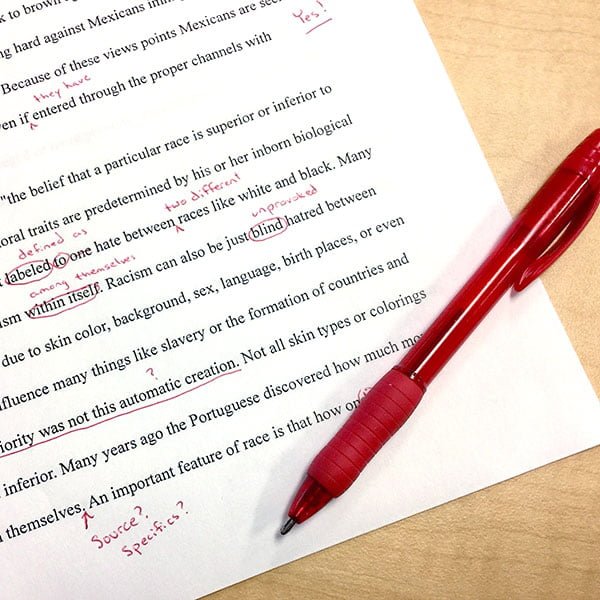All too often, proper editing is the missing piece of the puzzle for self-publishing authors, who invest all of their hard work, talent, skill, and energy writing their book, only to fall short due to editing oversights. This commonly leads to terrible reviews, poor reception, and low sales, for authors who may have had a good idea and a good manuscript, to begin with!
A Common Mistake
Most negative book reviews deal with content issues or mistakes that a good editor would have addressed. Here’s a few excerpts from Blue Ink reviews, that exemplify the kind of mistakes that get in the way of otherwise quality writing: “Unfortunately, the book appears not to have felt the copy editor’s touch, as it is riddled with errors in spelling, capitalization, punctuation, possessives, plurals, homonyms, and use of quotation marks.” “The third-person narrative wobbles from overall omniscient to third-person-limited, and there are jarringly abrupt shifts in time and place.” “The seeming lack of any proofreading leads to an exasperating reading experience that is made even more challenging by a storyline that is disjointed, aimless, and, at times, self-indulgent.” Skimping on the editing process can stop the rest of your hard work from paying off the way it should. With so many self-publishing authors making this mistake, editing your book properly will help you stand out from the competition.
Aspects of Book Editing
Proper book editing is a multifaceted procedure; it’s not as simple as a quick read-through to look for obvious mistakes. Izzard’s book editing service helps to hone your initial, unpolished manuscript into a smooth-reading, top-notch final product that is at home alongside books from major publishing houses. Book editing is a profession unto itself, and expertise from professionals will make sure that readers enjoy, and ultimately recommend your book. At a minimum, a new author should bring expertise from a proofreader, a copy editor, and a content editor. A content editor edits for accuracy and clarity of your book’s content. They will often also look for plagiarism, check for the sources of quotations, and look for consistent use of pronouns, tenses, and other conventions of language. In fiction, content editing will focus on the plot, pacing, character, setting, and voice. For non-fiction writers, a fact-checker will ensure the accuracy of specific facts and figures, such as dates in a history book – this can sometimes be included in content editing. This kind of editing should happen early on. A copy editor looks at the grammar and style of your writing, to make sure it complies with a consistent set of style standards, such as the Chicago Manual of Style. In other words, copyediting functions to make sure the language sounds the way it should. A proofreader’s job is to look for typos and to make sure that typesetting rules are followed. Proofreading is really about making sure the book “looks” right. This is crucial to its readability as well as its professional, finished appearance. It is hard to enjoy a book if you have to work to read it! This should be your last editing step. But even this doesn’t cover all the aspects of book editing services you may need to get your book as near to perfect as possible. Specialist fact-checkers are sometimes required for genres like historical fiction or sci-fi, to look for anachronisms or scientific errors. A line editor looks at the language of your book on the line level, to address syntax inconsistencies and repetition – some manuscripts will require more line editing than others. Line editing is often combined with copyediting. A developmental editor looks at your book from the audience’s point of view, helping you develop your book’s content, often before you’ve completed your manuscript. This can also include structure editing, which focuses on the flow and, you guessed it, the structure, of your manuscript. Which kinds of editing your manuscript needs most will depend on your strengths and weaknesses as a writer, the type of book you are writing, and how polished your manuscript is to begin with. At the very least, you will need a content editor and proofreader, and a copy or line editor.
Izzard is Here to Help
Izzard’s 10 Secrets to a Bestseller: An Author’s Guide to Self-Publishing Workbook will help you figure out what kind of book editing services you need most before we help you build a first-rate editing team tailored to your needs. Izzard will use our Find, Pick, Execute method to get you the editing results you need. When you work with Izzard, you’ll have access to a personal publishing consultant for each publishing service, including our book editing service. We will consult with you to “Find” where your book needs the most help. We will listen to what you want to accomplish, and help you “Pick” editors that will bring out the best in your manuscript, in every step of the editing process. Our proven, seasoned editors all have experience working with major, Big 5 publishers, and will bring that high standard of quality to your book. Finally, we “Execute” the chosen editing plan, working together with you and your editor, and managing the process while allowing you to focus on your own area of expertise – the writing process itself. A quality book editing service will offer a smoother experience for your readers, eliminate problems with content and structure, and make sure you tell the best possible version of your story.




